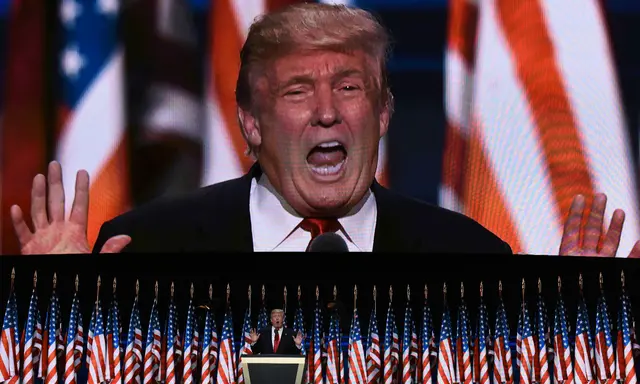If Donald Trump were to be elected president of the United States in November, and follow through on his economic and trade policies, Asian economies would be badly affected, with Hong Kong among the most vulnerable, according to analysts.
“If Trump is elected I expect he will make China his major target,” said Alastair Newton, director of Alavan Business Advisory.
Republican presidential nominee Donald Trump takes the stage on the third day of the Republican National Convention in Cleveland, Ohio, the United States, July 20, 2016. Photo: Xinhua
“I expect Trump will accuse China of being a currency manipulator and impose the maximum tariffs he can, and I expect China will retaliate ... Also, in this scenario, I expect China to take the US to the WTO,” said Newton.
In his speech accepting the Republican Party’s nomination for resident on July 22, Trump said his trade policy “includes stopping China’s outrageous theft of intellectual property, along with their illegal product dumping, and their devastating currency manipulation”.
“They are the greatest currently manipulators ever,” according to a transcript published by the Washington Post.
Hong Kong would be particularly vulnerable to a US-China trade war.
Ivanka Trump, daughter of Republican presidential nominee Donald Trump, speaks on the last day of the Republican National Convention in Cleveland, Ohio, the United States, July 21, 2016. Photo: Xinhua
Writing on the implications for Asia of a Trump presidency, Nomura analysts Young Sun Kwon and Minoru Nogimori said: “Hong Kong is the entrepôt for a significant amount of business between China and the US. Declining trade volumes would be negative for local business in packaging exports from the mainland destined for the US, container ports and transhipments.
“This would have a knock-on effect on other sectors.”
Mainland China itself, while at risk, looks likely to be less affected than Hong Kong.
Yang Zhao, Nomura’s chief China economist added the impact of a Trump presidency on China might result in a smaller trade surplus and more capital outflows due to increased trade frictions and geopolitical risks in the region.
“We believe the impact should be limited, however, as China and the US have more common interests than conflicts in the region... Furthermore, China is relying more on domestic demand and less on external demand, as suggested by a declining trade dependence ratio,” said Zhao.
Delegates supporting Donald Trump cheer on the second day of the Republican National Convention in Cleveland, Ohio, the United States, July 19, 2016. Photo: Xinhua
Alastair Newton also said the impact of a Trump presidency would be uncertainty in markets, and the effect on geopolitics in Asia was even less clear.
“Trump has both said that he would send US troops to the region to threaten China, though I’m not sure how that would work.
“But he has also said that he would withdraw troops from Japan and South Korea unless those countries bore the full cost of the deployment.”
In this context, the Nomura report recommended east Asian defence equities as being an attractive bet for investors.
(SOUTH CHINA MORNING POST)
 简体中文
简体中文

